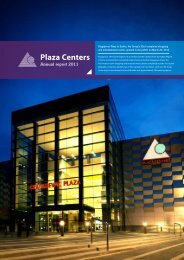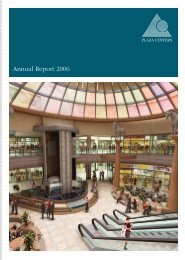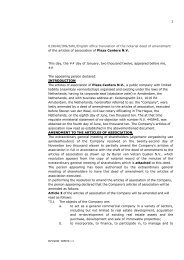Annual report 2010 - plazacenters
Annual report 2010 - plazacenters
Annual report 2010 - plazacenters
Create successful ePaper yourself
Turn your PDF publications into a flip-book with our unique Google optimized e-Paper software.
Management and governance<br />
Risk management<br />
continued<br />
Legal and regulatory risk<br />
Like all companies, the Company is exposed to the changing<br />
regulatory environment in the countries and regions where<br />
it conducts business. The most notable risks are related to<br />
changes in environmental policy, changes in tax laws or their<br />
interpretation and expropriation of lands.<br />
In respect of the environmental policy, there is an increasing<br />
awareness of environmental issues in Central and Eastern Europe.<br />
This may be of critical importance in areas previously occupied<br />
by the Soviet Army, where soil pollution may be prevalent.<br />
The changes are coming in the form of environmental policy.<br />
New environmental regulations or a change in regulatory bodies<br />
that have jurisdiction over Plaza projects could result in new<br />
restrictions. The Group generally insists upon receiving an<br />
environmental <strong>report</strong> as a condition for purchase, or alternatively,<br />
conducts environmental tests during its due diligence<br />
investigations. Also, some countries such as Poland and the Czech<br />
Republic require that a developer carries out an environmental<br />
<strong>report</strong> on the land before building permit applications are<br />
considered. Nevertheless, the Group cannot be certain that all<br />
sites acquired will be free of environmental pollution. If a property<br />
that the Group acquires turns out to be polluted, such a finding<br />
will adversely affect the Group’s ability to construct, develop and<br />
operate a shopping and entertainment center on such property,<br />
and may cause the Group to suffer expenses incurred in cleaning<br />
up the polluted site which may be significant.<br />
Changes to the tax laws or practice in the countries in which the<br />
Company operates or any other tax jurisdiction affecting the<br />
Group could be relevant. Such changes could affect the value<br />
of the investments held by the Company or affect the Company’s<br />
ability to achieve its investment objective or alter the post-tax<br />
returns to shareholders. The tax positions taken by the Group,<br />
including the tax effect of transfer pricing and the availability<br />
of tax relief provisions, are also subject to review by various tax<br />
authorities. Under the Dutch participation exemption rules,<br />
income including dividends and capital gains derived by Dutch<br />
companies in respect of qualifying investments in the nominal<br />
paid-up share capital of resident or non-resident investee<br />
companies, are exempt from Dutch corporate income tax<br />
provided the conditions as set under these rules have been<br />
satisfied. The participation exemption rules and more particularly<br />
the statutory conditions thereunder have been amended with<br />
effect of January 1, 2007. Such amended conditions require,<br />
among others, a minimum percentage of ownership interest in<br />
the investee company and require the investee company to satisfy<br />
either of, or both, the newly introduced assets test and the<br />
amended “subject to tax” test. Should the Company not be in<br />
compliance with all participation exemption requirements or<br />
should the participation exemption rules be amended, this could<br />
affect its tax relief which will have an adverse effect on its cash<br />
flow position and net profits. In addition, if the Company were<br />
to be treated as having a permanent establishment, or as<br />
otherwise being engaged in a trade or business, in any country<br />
in which it develops shopping and entertainment centers or<br />
in which its centers are managed, income attributable to or<br />
effectively connected with such permanent establishment<br />
for trade or business may be subject to tax.<br />
While the Group makes every effort to conduct thorough<br />
and reliable due diligence investigations, in some countries<br />
where former communist regimes carried out extensive land<br />
expropriations in the past, the Group may be faced with<br />
restitution claims by former land owners in respect of project<br />
sites acquired by it. If upheld, these claims would jeopardize the<br />
integrity of its title to the land and its ability to develop the land.<br />
Internal control and risk management procedures<br />
I) Definition and objectives<br />
Internal control is the structure within which resources, behavior,<br />
procedures and actions are implemented by the Executive Board<br />
and throughout the Company to ensure that activities and risks<br />
are fully controlled and to obtain the reasonable assurance that<br />
the Company’s strategic objectives have been met.<br />
Plaza’s internal control procedures aim to ensure:<br />
• the optimization of operations and the smooth functioning<br />
of the Groups internal processes;<br />
• compliance with current laws and regulations;<br />
• the application of instructions and directions given by the<br />
Executive Board; and<br />
• the reliability of financial information.<br />
The system is based on the following three key principles:<br />
• the involvement of and taking responsibility by all personnel:<br />
all Group employees contribute to internal control procedures;<br />
each employee, at his or her level, should exercise effective<br />
control over the activities for which he or she is responsible;<br />
• the full extent of the scope covered by the procedures:<br />
the procedures should apply to all entities (operational and<br />
legal); and<br />
• separation of tasks: control functions should be independent<br />
of operating functions.<br />
The internal control procedures designed to address the<br />
objectives described above cannot, however, ensure with<br />
certainty that these objectives will be achieved, since all<br />
procedures have inherent limitations. However, they aim<br />
to make a very significant contribution in this direction.<br />
60<br />
Plaza Centers N.V. <strong>Annual</strong> <strong>report</strong> <strong>2010</strong>








